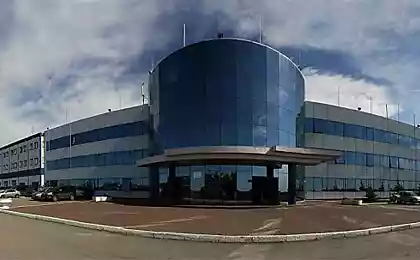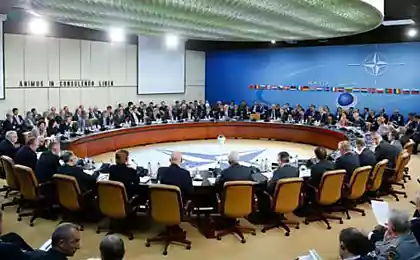647
Western sanctions hit the Baltic ports.
Anti-Russian sentiment escalated in recent months in the West, pushing Russia to reduce dependence on the Baltic ports.
Today the Russian Federation in the Baltic Sea there is a large St. Petersburg, Vysotsky and seaside ports are actively being built sea gate in Ust-Luga. The Baltic countries have much to lose as a result of Russian seaports, preheated threats from the West. After separation of the Baltic states, Russia remained without a major trading ports in the Baltic Sea, and it is precisely through them, our country exports raw goods, including oil, coal and fertilizers. What, in fact, the Baltic countries - Lithuania, Latvia and Estonia - have earned good in recent years. At the same time, according to analysts' estimates Freeport, the largest market share among the ports of the Baltic port of Tallinn holds (27 percent), Klaipeda (23 percent), Riga (22 percent) and Ventspils (18 percent).
Marine harbor on the Baltic Sea are primarily used for the export of Russian oil, timber, metals and imports of machinery, industrial and food products. It is this pool until recently played a leading role in foreign trade, in its ports accounted for 90 percent of turnover. And it is hardly an exaggeration to note that the Baltic country gained independence in the early 90-ies of the last century, literally fed by Russia due to its transit location sea gates. Same Latvia with its port of Ventspils, which since the Soviet Union was among the leaders in export transshipment of oil and petroleum products to the Russian Federation has established shamelessly inflated transit tariffs, knowing that her rival in the Baltic Sea there.
However, the situation is changing. About a decade ago, Russia began to reduce dependence on the countries of the Baltic marine transportation. In 2001, in the Leningrad region started a major seaport of Ust-Luga, the development of which is actively conducted today. In 2010, the coal terminal Ust-Luga port "Rosterminalugol", owned by large Russian shipper of "KRU" ferried about 7, 5 million tons of coal, thus taking away a significant chunk of revenue from the Baltic countries, and particularly in Estonia. But this is not the only port that is actively developing in Russia today. As the correspondent of Pravda. Ru State Duma deputy, member of the Committee on Transport and former sailor Andrei Kolesnikov, just over the past month against the backdrop of threats from the Russian ports of the European Union increased the total cargo on 5 and 6 percent.
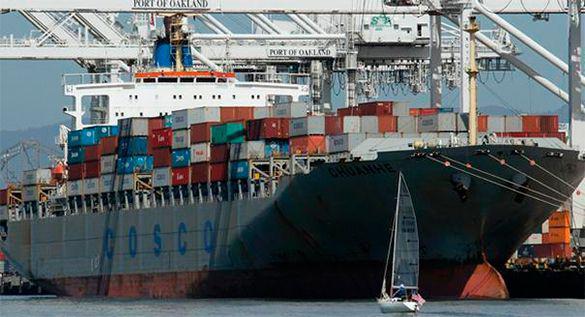
We in Ust-Luga and St. Petersburg, and Kaliningrad has a seaport, where 26 stevedoring companies. Replace the Baltic course, they will be able to calmly, because we have the ports, especially Kaliningrad, uploaded somewhere percent of 60 - says Andrey Kolesnik. - And, in fact, the Baltic ports meant Tallinn, Riga, Klaipeda, Ventspils, they can quite happily replace. We have all of these ports are equipped with the latest technology: they and heavy cranes, they can and shipping, and work with container cargo, with oil and heavy fractions (oil is meant), plus coal terminals are, and mooring line equipped with suitable and port services are working well with us, that is, customs, border guards. Only one Kaliningrad seaport 28 stevedoring companies, that is even within our ports there is a competitive environment.
Here we can recall the ease with which Russia in the early spring refused transit services of the Lithuanian port of Klaipeda, which was primarily due to the aggressive attitude of the Lithuanian authorities in relation to Russia in light of the Ukrainian events. A written notice of the suspension of the food supply through the port in Russia was received cargo terminal port of Klaipeda March 16. The result was not long in coming: in I quarter of 2014 turnover of the Lithuanian port decreased by 13, 5 per cent compared with the same period of 2013, ie up to 10, 21 million tons. And if for the 2013 turnover of the port amounted to 33, 42 million tons, but now, if Russia will not come back to Klaipeda, the turnover of goods and, hence, profits port significantly decreases.
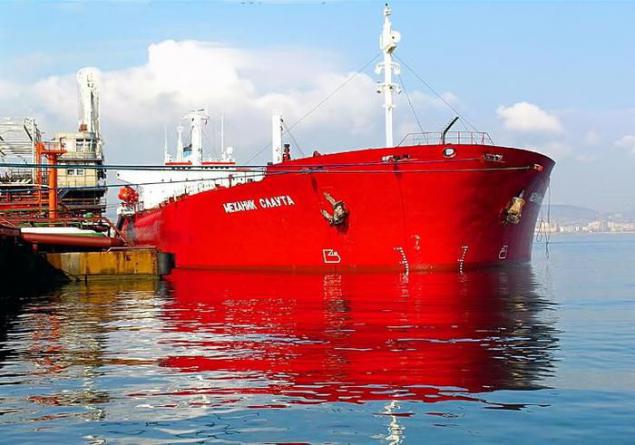
In the Baltic ports may have problems, because if they lose the cargo, its only then it will be difficult to return, then the cargo can go not only to the Russian ports. Do not forget that there are those in the Baltic ports as Hamburg, Bremen, Bremerhaven. So, these ports should just take care of your traffic, because if will take cargo from the Baltic ports, if they are there any implement sanctions, then, in fact, it is to not come back, that is, they will suffer losses & quot ;, - says Andrey Kolesnik.
Meanwhile, construction of the largest ports in the Baltic port of Ust-Luga, 2018, is expected to reach capacity in the amount of 180 million tons of various cargo. In addition, it will be the only Russian port on the Baltic Sea capable of receiving ships of up to 160 thousand tons. In the words of Sergey Ivanov, while still being in the position of deputy prime minister, in connection with the development of a new port in the Leningrad region in 2015 Russia will have enough of its resources to stop all exports through the Baltic ports. And today, experts believe that Russia is ready to fully to stop "feeding" the Baltic harbor and refocus on their own cargo transportation hubs: the Big Port of St. Petersburg, Vysotsky and seaside ports and commercial port at Ust-Luga.
Before World War II all the ports that you mentioned, based the entire Baltic fleet and all coped - told Pravda.Ru Russian naval historian George Costa. - When we managed to win (this great victory!), And we have created in the West, we will say your Baltiysk instead Swinemunde as called then, of course, the possibility of the fleet in terms of improved monitoring of the Baltic Sea. But in order to cope, a decision should be very simple. We should develop these four ports that you called, and develop very effective in terms of time, in terms of features, equipment and so on. After all, there were times when everything was based only on the general Kronstadt.
Thus the historian stressed that the threat from the West, very poor may end up for the European Union, which from the side floats is not only a major energy supplier and the largest market, but also the exporter, fueling the economy of Eastern European countries. That's part of the development of seaports anti-Russian speech Western counterparts only give speed development of its own infrastructure and strengthening the independence of the countries with which political differences are growing every year.
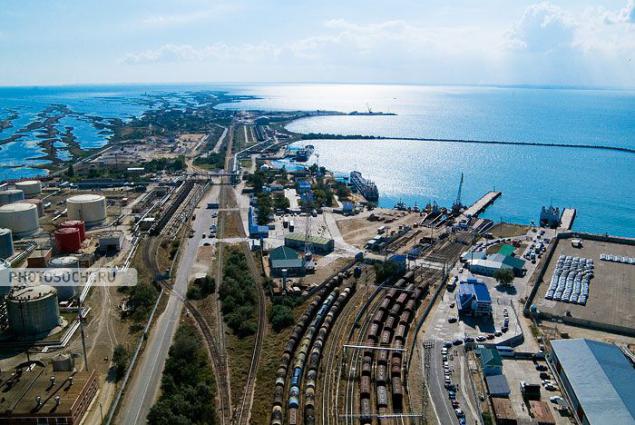
Source: www.pravda.ru
Today the Russian Federation in the Baltic Sea there is a large St. Petersburg, Vysotsky and seaside ports are actively being built sea gate in Ust-Luga. The Baltic countries have much to lose as a result of Russian seaports, preheated threats from the West. After separation of the Baltic states, Russia remained without a major trading ports in the Baltic Sea, and it is precisely through them, our country exports raw goods, including oil, coal and fertilizers. What, in fact, the Baltic countries - Lithuania, Latvia and Estonia - have earned good in recent years. At the same time, according to analysts' estimates Freeport, the largest market share among the ports of the Baltic port of Tallinn holds (27 percent), Klaipeda (23 percent), Riga (22 percent) and Ventspils (18 percent).
Marine harbor on the Baltic Sea are primarily used for the export of Russian oil, timber, metals and imports of machinery, industrial and food products. It is this pool until recently played a leading role in foreign trade, in its ports accounted for 90 percent of turnover. And it is hardly an exaggeration to note that the Baltic country gained independence in the early 90-ies of the last century, literally fed by Russia due to its transit location sea gates. Same Latvia with its port of Ventspils, which since the Soviet Union was among the leaders in export transshipment of oil and petroleum products to the Russian Federation has established shamelessly inflated transit tariffs, knowing that her rival in the Baltic Sea there.
However, the situation is changing. About a decade ago, Russia began to reduce dependence on the countries of the Baltic marine transportation. In 2001, in the Leningrad region started a major seaport of Ust-Luga, the development of which is actively conducted today. In 2010, the coal terminal Ust-Luga port "Rosterminalugol", owned by large Russian shipper of "KRU" ferried about 7, 5 million tons of coal, thus taking away a significant chunk of revenue from the Baltic countries, and particularly in Estonia. But this is not the only port that is actively developing in Russia today. As the correspondent of Pravda. Ru State Duma deputy, member of the Committee on Transport and former sailor Andrei Kolesnikov, just over the past month against the backdrop of threats from the Russian ports of the European Union increased the total cargo on 5 and 6 percent.

We in Ust-Luga and St. Petersburg, and Kaliningrad has a seaport, where 26 stevedoring companies. Replace the Baltic course, they will be able to calmly, because we have the ports, especially Kaliningrad, uploaded somewhere percent of 60 - says Andrey Kolesnik. - And, in fact, the Baltic ports meant Tallinn, Riga, Klaipeda, Ventspils, they can quite happily replace. We have all of these ports are equipped with the latest technology: they and heavy cranes, they can and shipping, and work with container cargo, with oil and heavy fractions (oil is meant), plus coal terminals are, and mooring line equipped with suitable and port services are working well with us, that is, customs, border guards. Only one Kaliningrad seaport 28 stevedoring companies, that is even within our ports there is a competitive environment.
Here we can recall the ease with which Russia in the early spring refused transit services of the Lithuanian port of Klaipeda, which was primarily due to the aggressive attitude of the Lithuanian authorities in relation to Russia in light of the Ukrainian events. A written notice of the suspension of the food supply through the port in Russia was received cargo terminal port of Klaipeda March 16. The result was not long in coming: in I quarter of 2014 turnover of the Lithuanian port decreased by 13, 5 per cent compared with the same period of 2013, ie up to 10, 21 million tons. And if for the 2013 turnover of the port amounted to 33, 42 million tons, but now, if Russia will not come back to Klaipeda, the turnover of goods and, hence, profits port significantly decreases.

In the Baltic ports may have problems, because if they lose the cargo, its only then it will be difficult to return, then the cargo can go not only to the Russian ports. Do not forget that there are those in the Baltic ports as Hamburg, Bremen, Bremerhaven. So, these ports should just take care of your traffic, because if will take cargo from the Baltic ports, if they are there any implement sanctions, then, in fact, it is to not come back, that is, they will suffer losses & quot ;, - says Andrey Kolesnik.
Meanwhile, construction of the largest ports in the Baltic port of Ust-Luga, 2018, is expected to reach capacity in the amount of 180 million tons of various cargo. In addition, it will be the only Russian port on the Baltic Sea capable of receiving ships of up to 160 thousand tons. In the words of Sergey Ivanov, while still being in the position of deputy prime minister, in connection with the development of a new port in the Leningrad region in 2015 Russia will have enough of its resources to stop all exports through the Baltic ports. And today, experts believe that Russia is ready to fully to stop "feeding" the Baltic harbor and refocus on their own cargo transportation hubs: the Big Port of St. Petersburg, Vysotsky and seaside ports and commercial port at Ust-Luga.
Before World War II all the ports that you mentioned, based the entire Baltic fleet and all coped - told Pravda.Ru Russian naval historian George Costa. - When we managed to win (this great victory!), And we have created in the West, we will say your Baltiysk instead Swinemunde as called then, of course, the possibility of the fleet in terms of improved monitoring of the Baltic Sea. But in order to cope, a decision should be very simple. We should develop these four ports that you called, and develop very effective in terms of time, in terms of features, equipment and so on. After all, there were times when everything was based only on the general Kronstadt.
Thus the historian stressed that the threat from the West, very poor may end up for the European Union, which from the side floats is not only a major energy supplier and the largest market, but also the exporter, fueling the economy of Eastern European countries. That's part of the development of seaports anti-Russian speech Western counterparts only give speed development of its own infrastructure and strengthening the independence of the countries with which political differences are growing every year.

Source: www.pravda.ru







